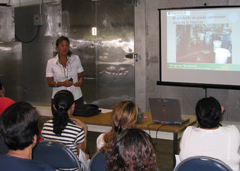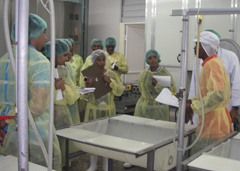Safety and Quality of Seafood Products
HACCP workshops improve the quality and safety of Virginia processed seafood products
Relevance: Training in Hazard Analysis and Critical Control Points (HACCP) for the seafood industry and newly hired regulatory personnel is essential to ensure safe seafood products for public consumption.

Our response: Three three-day and three one-day HACCP workshops were held for industry and regulatory personnel. Approximately 85 industry members from four states and regulatory personnel from the Virginia Department of Consumer Services and the U.S Food and Drug Administration attended the workshops.
The results: The seafood industry in Virginia has one of the most successful compliance rates with FDA seafood HACCP regulations. Industry and regulatory personnel receive the same training, resulting in better communication between the industry and regulators. Both federal and state inspectors have told us that our HACCP training has significantly improved the safety and quality of seafood products processed in Virginia.
Extension specialists: Michael Jahncke and Abigail Villalba
Compliance with processing practices ensures available, safe, and wholesome seafood products.
Relevance: Seafood processors in Virginia need dependable assistance to troubleshoot and solve deficiencies found during state and/or federal inspections and third-party audits. Many companies do not have in-house expertise to evaluate processing systems, and they rely on us to help correct deficiencies while keeping costs to a minimum. Addressing food safety deficiencies helps them manage risks, stay in compliance with regulatory requirements, and meet demand for safe and wholesome products.

Our response: We provided technical assistance to 14 seafood processors and one peanut processor in Virginia. Technical assistance included addressing deficiencies found during state and federal inspection reports and third-party audits, assessing existing manufacturing practices, observing and evaluating personnel hygiene practices, reviewing cleaning and sanitation procedures and cross-contamination issues, and sampling of product and environmental surfaces for microbial analysis. Based on these observations, recommended changes were discussed with companies.
The results: The changes recommended and adopted by the companies helped them to improve sanitation effectiveness, reduce product contamination and losses, and continue to market quality and safe seafood. Microbial analysis results pinpointed areas where resources needed to be placed to reduce cross-contamination. Statements excerpted from a follow-up survey sent to seafood processors indicated that these evaluations were effective at pinpointing problem areas so resources were spent where needed. For example, one processor said that the evaluation “revealed numerous problem areas in our plant. Training and recommended cleaning procedures from Virginia Tech staff were implemented, and the follow-up environmental sampling showed a near-perfect result.” Another company indicated, “The product and environmental sampling complements our sanitation program so we can continue to produce safe, quality, food products.” Oftentimes, our interventions and recommendations have resulted in the prevention of regulatory action and/or enhanced the profitability of processors by expanding their product marketability. Another processor noted, “Without the services from this Extension service, my company would fail the product protocols established for several major grocery chains.”
Extension specialists and staff: Abigail Villalba, Michael Jahncke, and Helen Crocker




